- หน้าหลัก
- บทความหัวข้อ Icon NOW: Bo Songvisava Keeps Heritage Alive in Thai Cuisine
บทความหัวข้อ Icon NOW: Bo Songvisava Keeps Heritage Alive in Thai Cuisine
2021/12/03
What’s in an icon? As part of Thailand NOW’s mission to share authentic insights into all things Thai, we’re spotlighting iconic individuals who have not only excelled in their respective areas, but influenced the complex tapestry of Thailand as it exists today and, in doing so, inspire us to be a part of the fabric of Thai society.
In this Icon NOW interview, Chef Duangporn “Bo” Songvisava talks about staying true to the root of Thai cuisine and making environmental choices as a restaurateur.

For Chef Duangporn “Bo” Songvisava, co-founder of Bangkok restaurants Bo.Ian and Err Urban Rustic Thai and boutique grocer Bo.lan Grocer, Thai food isn’t just a taste, it’s a heritage.
“I always respect people who cooked before me. I respect the recipe that has been written, that has been passed on for many decades or centuries in Thailand,” she says.
For Bo, part of that respect involves adjusting recipes to optimal taste, adding the perfect amount of each ingredient until there is just the right balance between the different flavors. It’s common for the Thai chef to produce multiple flavors in one dish: spicy, sweet, sour, and salty. She also works to create a variety of textures, with crispy, soft, and crunchy foods.
One example is Bo.lan’s green curry, which combines garlic, shallots, lemongrass, and kaffir lime zest. The curry also calls for white peppercorns, cumin seeds, and coriander seeds.
“For me, I like to show the real, the root, the core of Thai cuisine. I never compromise the flavor. If the dish [has] to be spicy—like the green curry is a spicy curry—I will make it spicy. If the tom yum has to be hot and sour, I will put enough chilli to make sure it’s hot,” she says.
“That’s how I cook, to make sure that the flavor, the texture, and the ingredients that I put in the dish are respectful to the people who cooked before me.”


One thing the MICHELIN-starred chef loves to tell people is that Thai cuisine is one of the few cuisines in the world that often combines 20 ingredients or more in a single dish, yet somehow it works.
Bo believes that food reflects political and environmental choices. The restaurateur is proud to have bought several ingredients for her seasonings from artisan suppliers, such as salt, shrimp paste, fish sauce, and palm sugar.
With a keen interest in eco-gastronomy, sustainability is a key principle. She has started a “zero waste to landfill” campaign, and reuses the leftovers of several ingredients.
Oil waste is turned into soap. Egg shells become fertilizer. Dried prawn shells become organic chicken feed. Leftover rice is mixed with chrysanthemum flowers and pandan leaves to make a refreshing, fragrant tea. The acclaimed chef even reuses leftover food by composting it with dry leaves.
“We try not to have any waste in the bin bag,” Bo says.
In addition to food, bottles and dishes are also reused. Wine bottles that can’t be recycled are turned into water jugs. In the restaurants of Asia’s top female chef, there are no single-use plastic bottles.
She also delivers dishes to customers in tiffin boxes, which the customers can then send back for her to reuse. This way, Bo isn’t reliant on disposable to-go boxes, which are responsible for a significant amount of plastic waste in the era of food delivery. It means a lot to her for Bangkok residents to have access to sustainable food, served in a sustainable way.

As the pandemic continues to disrupt people’s lives, Bo found that the slowdown allowed her to discover new passions.
“With [COVID-19] dysfunction, I had enough time to digest what I really want to do, and one thing is [to start] a grocer,” she says.
With her restaurants closed during lockdown, their ingredient stockpiles began to grow. To avoid food waste, Bo founded Bo.lan Grocer, an organic and sustainable grocer based in the Thonglor neighborhood of Bangkok. During lockdown, the business delivered produce with recipes for Bo.lan dishes. Customers can then follow along with cooking classes through her Bo.lan Education Program.
When the restaurateur first started to develop the products for Bo.lan Grocer eight years ago, she did not have time to take her dream further—that is, until the COVID-19 pandemic. Now, it’s just one of her many endeavors.
While Bo believes in respecting the recipe, that doesn’t mean Thai food can’t change. It is this perspective on Thai cuisine that allows her to stay true to her heritage while adapting to the changing circumstances.
“Thai food is also really flexible and has so many dimensions. I don’t believe in standardized Thai food, so you have so much to be inspired by the ingredients, the [techniques], the cooking approach, and you can come up with your interpretations: it never dies.“
« บทความหัวข้อ Thailand Unveils Logo for APEC 2022 Chairmanship | ประชาสัมพันธ์งาน The 43rd Pia Film Festival in Kyoto »












